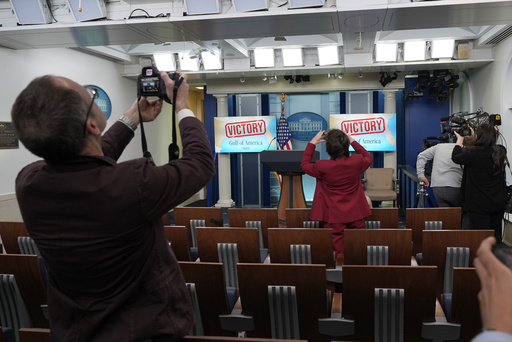In the heart of Washington on Monday, a federal judge chose not to immediately reinstate The Associated Press’ privileges to access presidential events. The judge noted that the news organization had not shown evidence of suffering irreparable harm due to the ban. He did, however, encourage the Trump administration to rethink its two-week-long prohibition, indicating that legal precedents don’t favor the White House’s position.
U.S. District Judge Trevor N. McFadden made it clear that his decision was not final and stated that further analysis of the situation was required before a final ruling could be issued. While the AP had not yet demonstrated damage necessitating immediate intervention, McFadden warned the White House that the law didn’t support its decision to exclude AP simply because of its reference to the “Gulf of Mexico” rather than “Gulf of America,” in line with a Trump-issued executive order.
Currently, the White House can maintain the AP’s restricted access from the Oval Office and beyond, at least until the next scheduled hearing on March 20. AP spokesperson Lauren Easton expressed optimism following the session, stating, “We look forward to our next hearing on March 20 where we will continue to stand for the right of the press and the public to speak freely without government retaliation. This is a fundamental American freedom.”
In the lead-up, the White House introduced displays in the briefing room reading “Gulf of America” and “Victory,” and reiterated, “As we have said from the beginning, asking the President of the United States questions in the Oval Office and aboard Air Force One is a privilege granted to journalists, not a legal right.”
The argument central to the case revolves around whether excluding a specific news outlet amounts to viewpoint discrimination. Brian Hudak, representing the government, pointed out that past access by the AP doesn’t guarantee continued presence indefinitely and labeled the AP’s previous access as “extra-special.” HUDak insisted that the President has discretion over whom he engages with.
Conversely, Charles Tobin, representing the AP, argued that the issue was more about unconstitutional practices rather than whether Trump must answer their questions. Tobin asserted, “We’re not arguing that the president of the United States has to answer The Associated Press’ questions. The issue is that once he lets the press pool in he can’t say, ‘I don’t like you. You’re fake news. Get out.’”
The judge, nominated by Trump, questioned both parties intensely. He highlighted the ambiguity regarding the role of the White House Correspondents’ Association in determining press pool access and expressed concern over the apparent discrimination against a particular outlet.
The dispute traces back to the Trump administration’s recent restrictions on the AP’s access to key areas such as the Oval Office and Air Force One, citing a deviation from Trump’s executive order regarding the naming of the Gulf. The Associated Press has maintained the “Gulf of Mexico” terminology, affirming that its audience is global.
In response, AP initiated legal action against White House officials, labeling the restrictions a direct violation of First Amendment rights. The courtroom witnessed high-ranking individuals on both sides, including representatives from news organizations that typically support Trump, urging the administration to reverse its policy.
The defiance of Trump’s executive naming decision places the spotlight on the AP’s influential style guide, used by numerous journalists and academic institutions. The administration’s aim for a standardized usage of “Gulf of America” in American media discourse underscores deeper tension over press freedom and governmental influence.
This case adds to a series of confrontations over press access during Trump’s presidency, recalling an earlier dispute with CNN’s Jim Acosta, wherein a court ruled in favor of restoring access after it was initially revoked.


